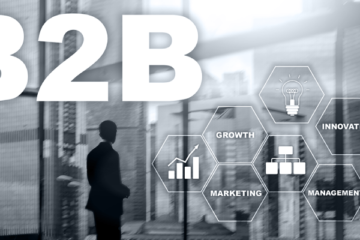In the rapidly evolving landscape of B2B marketing, the key to the success of a marketing campaign lies in not just crafting compelling campaigns but also in meticulously measuring their impact. As businesses navigate through getting a higher competitive advantage, the ability to launch effective B2B campaigns and accurately gauge their success becomes paramount. Beyond any conceptual strategies revolving around the technicalities of B2B marketing, the primary step is to clearly define the objective of the campaign along with the key performance indicators (KPIs). So, from lead generation, brand awareness, to conversion rates, a well-defined goal or objective serves as the guiding light to measure the Return of Investment (ROI) of the campaign. Furthermore, to get a better clarity on the effectiveness of a B2B marketing campaign strategy, it is conducive to understand the different strategies and optimize future campaigns by leveraging the advanced analytical tools. These tools have robust features to track and analyze various facets of your B2B marketing campaigns. Furthermore, these analytical tools can keep a keen eye on website traffic, user behavior, and conversion paths to gain a comprehensive understanding of your B2B campaign’s performance. The analysis can unleash great insights on building strategies for strong lead generation aligning with apt audience segmentation for engagement and drive conversion rates at different stages of the sales funnel.
Let’s further explore 7 tools to measure the effectiveness of B2B marketing campaigns as follows:
- Google Analytics:
Google Analytics stands as the cornerstone of web analytics that provides comprehensive insights into website traffic and user behavior. With setting up goals and conversion tracking, it allows B2B marketers to measure specific user interactions, such as form submissions or downloads, providing a tangible way to gauge success. Furthermore, the use of UTM parameters helps dissect campaign-specific traffic sources, offering insights into the effectiveness of different marketing channels. Google Analytics not only showcases where your audience is coming from but also empowers marketers to make informed decisions about optimizing their digital presence for B2B marketing campaigns.
- HubSpot:
An all-in-one encompassing tool, HubSpot integrates inbound marketing, sales, and customer service platform. Using HubSpot will help in tracking lead generation and customer acquisition costs become seamless. This enables marketers to attribute revenue to specific marketing activities accurately. HubSpot also excels in creating a centralized hub for customer interactions, facilitating better collaboration between marketing and sales teams for a more cohesive strategy.
- Marketo:
Marketo is a marketing automation platform that helps in management of and nurturing leads. Beyond automating routine tasks, Marketo offers advanced analytics to track lead attribution and conversion rates. This allows B2B marketers to understand the impact of various touchpoints on the customer journey. By analysing the revenue generated from specific marketing campaigns, Marketo provides actionable insights to optimize ongoing strategies for B2B marketing campaigns. The platform’s strength lies in its ability to align marketing efforts with sales goals, fostering a more efficient and revenue-centric approach to B2B marketing.
- Bizible:
Bizible specializes in marketing attribution and planning, providing insights into the customer journey for B2B marketers. Traditional attribution models often fall short in capturing the intricacies of the customer journey, but Bizible provides a comprehensive solution. By attributing revenue to specific touchpoints along the customer journey, marketers gain a nuanced understanding of how various channels contribute to the overall conversion process. This granularity in attribution is invaluable for optimizing marketing spend and focusing resources on the most impactful channels, ultimately leading to a more efficient and ROI-driven marketing strategy for B2B marketing campaigns.
- Datorama:
Datorama, now part of Salesforce, serves as a marketing intelligence platform that transforms raw data into actionable insights. By consolidating data from various sources, Datorama enables B2B marketers to create custom dashboards and reports tailored to their specific marketing needs. The ability to visualize marketing performance across different channels provides a holistic perspective, empowering marketers to make data-driven decisions. Datorama excels in simplifying the complexity of data analysis, making it an indispensable tool for B2B marketing companies aiming to extract meaningful insights from their diverse datasets.
- Tableau:
Tableau is a powerful data visualization tool that integrates seamlessly with various data sources. Integrating seamlessly with various data sources, Tableau enables marketers to create interactive dashboards that vividly illustrate marketing metrics. This visual representation is instrumental in uncovering patterns, trends, and outliers, fostering a deeper understanding of marketing performance for B2B campaigns. By visualizing ROI across different campaigns and channels, Tableau empowers marketing teams to identify areas of strength and weakness, facilitating informed decision-making. The platform’s user-friendly interface and powerful analytics capabilities make it an essential tool for B2B marketing companies seeking to elevate their data visualization and analysis game.
- CallRail:
A call tracking and analytics platform, CallRail is leveraged for B2B companies that rely on phone calls. This level of granularity in call tracking enhances the overall understanding of the customer journey and the role that phone calls play in the B2B sales process. By attributing phone calls to specific campaigns, marketers gain insights into the effectiveness of different marketing channels in driving valuable leads. CallRail’s contribution extends beyond online interactions, bridging the gap between digital and offline touchpoints. This is an essential requirement for the success of B2B marketing campaigns.
In conclusion, integrating these tools into your B2B marketing strategy provides a comprehensive toolkit for measuring and optimizing ROI. From the foundational analytics of Google Analytics to the advanced attribution models of Bizible, each tool contributes a unique perspective. The synergy of these platforms empowers marketing companies to navigate the intricacies of the B2B landscape successfully. By leveraging the strengths of these tools, marketing professionals can make data-driven decisions, refine their strategies, and ultimately achieve maximum impact and success in the competitive B2B space.

